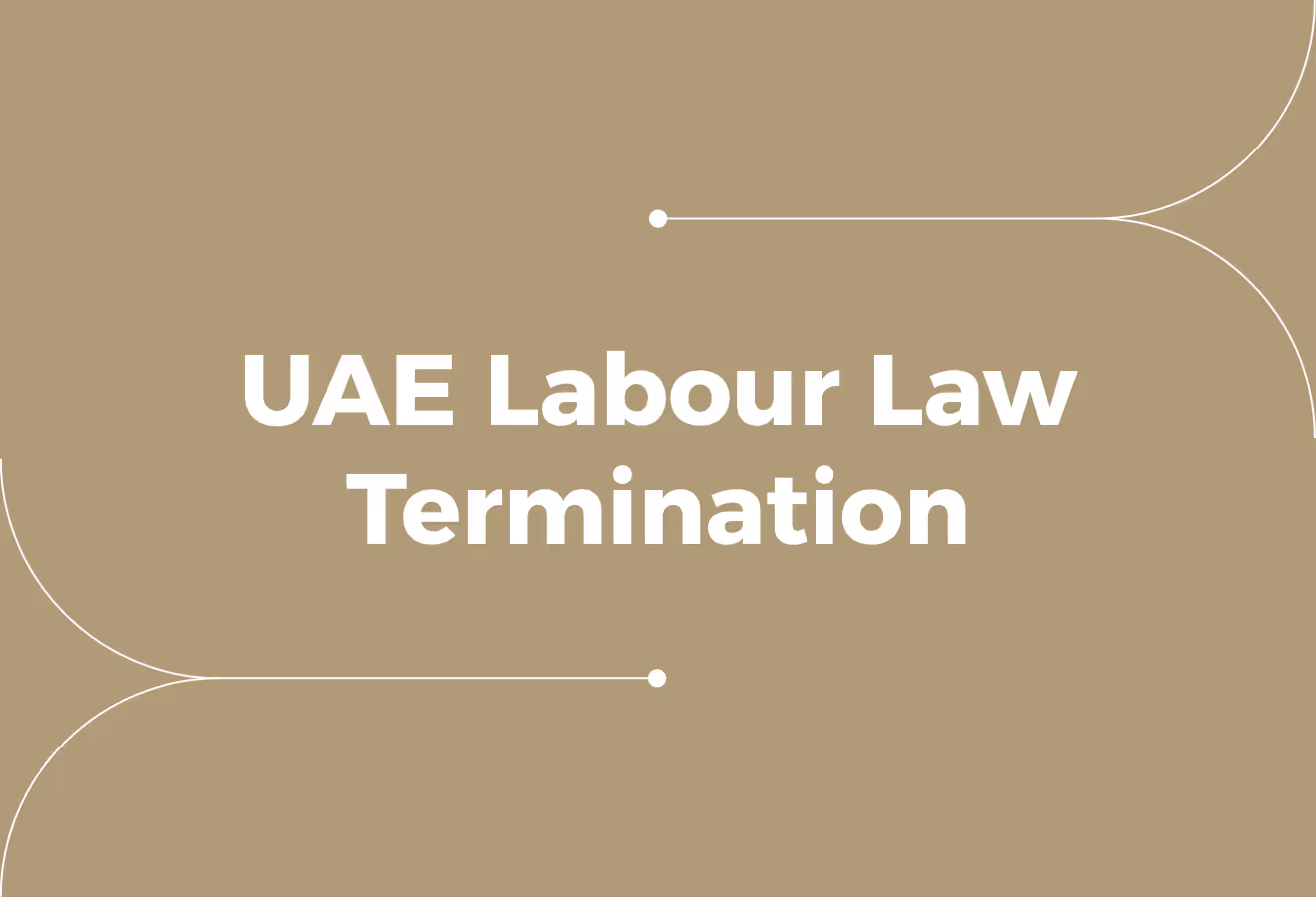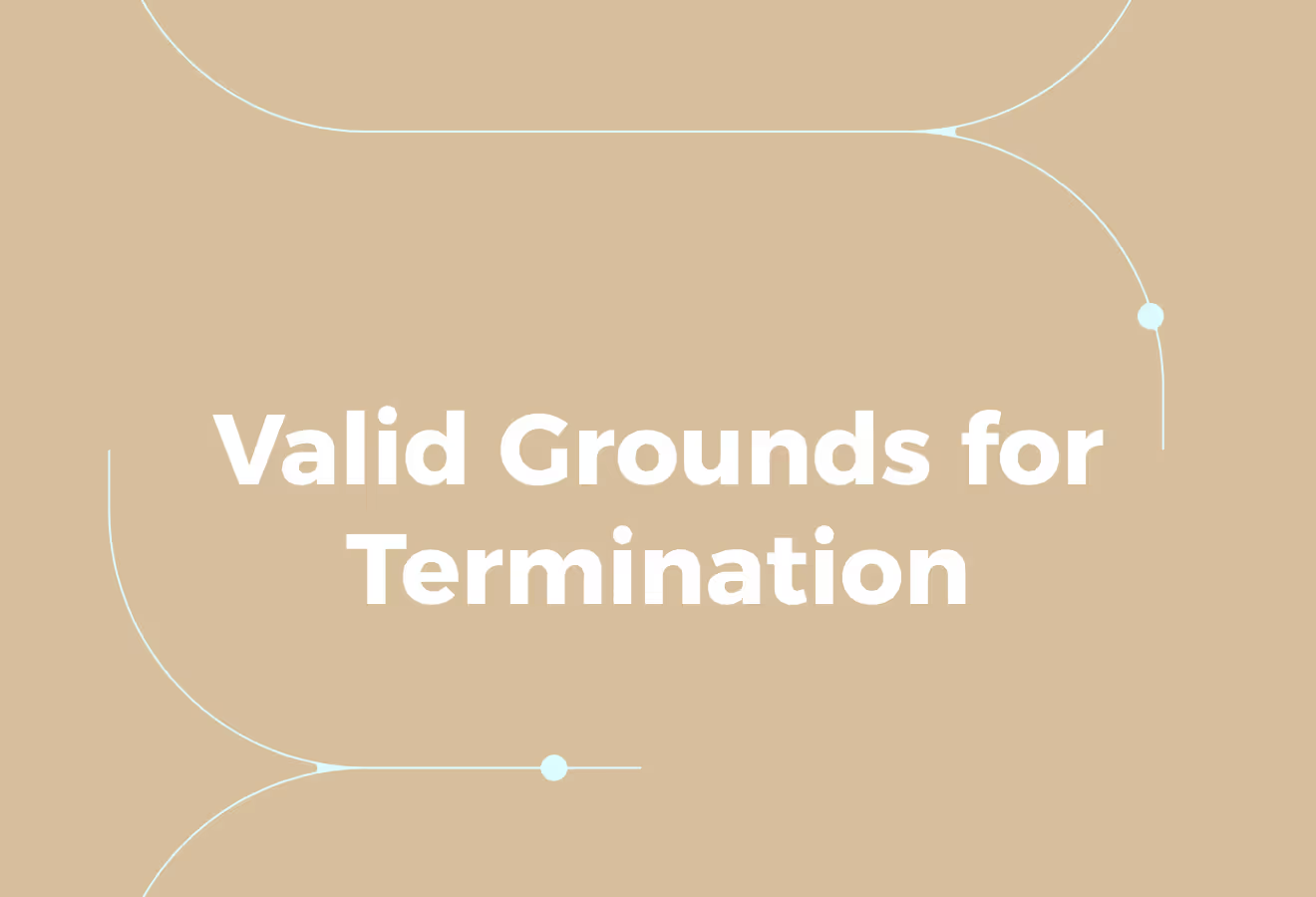UAE Labour Laws on Termination: Rules & Employer-Employee Rights

When it comes to managing staff in the UAE, termination is a challenging aspect of employment. The law outlines various rules and procedures governing employment termination, including the rights and obligations of both the employer and the employee. Understanding these provisions is essential to ensuring compliance and avoiding legal issues. This article offers insights into UAE labour laws on termination, aligning with the UAE salary guide. It will help you understand the rules, procedures, and the rights of both employers and employees, facilitating a smoother transition when employment ends.
Cercli’s UAE salary guide can help you understand how to terminate employment fairly and effectively. Integrating a global HR system further streamlines this process by centralizing compliance and employee management across regions. This resource provides information on average salaries across various sectors and job titles in the UAE, helping to determine whether an employee's compensation aligns with industry standards. If compensation is a factor or if you wish to mitigate potential issues, considering a raise or offering an enhanced severance package before proceeding with termination may be advisable.
Types of Employment Contracts and Their Impact on Termination

The UAE Labour Law outlines the types of employment contracts in the UAE, which can impact termination and end-of-service benefits. The key types of employment contracts in the UAE are unlimited contracts and fixed-term contracts.
Unlimited contracts have been phased out under the UAE Labour Law. All employment contracts must now be fixed-term (up to 3 years, renewable).
What You Need To Know About Fixed-Term Contracts
Under Federal Decree Law No. 33 of 2021, fixed-term contracts are now the only employment contracts applicable in the UAE. A fixed-term contract is for a specified duration, but it may be extended or renewed for a similar or shorter period.
Suppose the contract reaches its end without a formal renewal, but the parties continue working under the same conditions. In that case, the contract is considered to be automatically renewed under the same terms and conditions.
Seamless Transitions and Compensation Entitlements
This provides continuity for both employer and employee without the need to renegotiate the agreement entirely.
Any extension or renewal of a contract is factored into the calculation of end-of-service benefits, ensuring employees are compensated for their full length of service.
Why Are Fixed-Term Contracts Beneficial?
Regarding termination, fixed-term contracts provide clarity by outlining specific start and end dates. While either party may terminate early, doing so typically requires proper notice and, in some cases, compensation depending on the circumstances of the termination.
This shift to fixed-term employment reflects the UAE’s aim to bring greater clarity and legal consistency to the private sector.
Related Reading
Valid Grounds for Termination Under UAE Law

UAE Labour Law, as set out in Federal Decree Law No. 33 of 2021, outlines the conditions under which an employment contract may be terminated. These provisions aim to ensure that both employers and employees are protected by law and that termination processes are transparent, fair, and compliant with legal requirements.
General Situations for Contract Termination
According to Article 42, an employment contract may be terminated under the following circumstances:
- When the fixed term of the contract expires, it is not renewed or extended.
- By mutual written agreement between the employer and employee, the contract may be terminated early.
- If either party wishes to terminate the contract, they must observe the agreed notice period and follow the termination provisions set out in the law.
- Upon the death of the employer, if the contract is linked to the employer’s services or business.
- In the event of the worker’s death or permanent incapacity, certified by an approved medical authority.
- Where the employee is sentenced to a custodial term of three months or more under a final court judgment.
- If the business is permanently closed, in line with UAE legislation.
- Due to bankruptcy, insolvency, or other significant economic or exceptional reasons, making continued operation impossible.
- Where a work permit cannot be renewed for reasons beyond the employer’s control.
These scenarios reflect the law’s intention to consider both operational realities and individual circumstances, maintaining a balanced employment environment.
Termination Without Notice by the Employer
Under Article 44, an employer is permitted to terminate an employee without notice if the employee engages in serious misconduct.
This includes, but is not limited to:
- Using a false identity or submitting forged documents.
- Causing profound material loss to the employer or deliberately damaging property, provided MoHRE is notified within seven working days.
- Breaching communicated health and safety instructions.
- Persistent underperformance, following two formal warnings.
- Revealing confidential business information resulting in damage or personal gain.
- Being under the influence of alcohol or drugs during work hours, or behaving in a way that breaches public morality at the workplace.
- Physically assaulting the employer, manager, or co-workers during working hours.
- Being absent without lawful excuse for more than seven consecutive or 20 intermittent days in a year.
- Misusing their role for personal gain.
- Working for another employer without following legal procedures.
Employers must conduct a written investigation and provide a written, justified termination notice before proceeding.
Termination Without Notice by the Employee
Similarly, Article 45 allows an employee to terminate their contract without notice if the employer:
- Fails to meet their contractual or legal obligations, after the employee has provided 14 working days’ notice and no remedial action has been taken.
- Has assaulted or harassed the employee, provided the matter is reported to the authorities and MoHRE within five working days.
- Requests that the employee perform substantially different work from what was initially agreed upon, without written consent, except in specific urgent cases as outlined in Article 12.
- Does not act to remove serious safety or health hazards, in line with the risk scenarios described in Cabinet Resolution No. 1 of 2022.
This framework reflects the UAE’s approach to employment relations, ensuring that both employers and employees have a clear understanding of their rights and responsibilities in the event of termination.
Comprehensive Workforce Management: From Local to Global
Cercli is designed for companies in the Middle East that need a flexible, compliant, and reliable way to manage their workforce, whether teams are local, remote, or across multiple countries. Built for the realities of doing business in the region, Cercli helps companies in the UAE, Saudi Arabia, and across MENA simplify HR operations, stay compliant with local regulations, and run payroll with confidence.
From managing WPS (Wage Protection System) registrations in the UAE, processing GOSI in Saudi Arabia, handling DEWS contributions, and ensuring contracts and benefits are compliant, Cercli simplifies regional payroll and HR. As companies hire remote employees, contractors, and global teams, Cercli provides comprehensive support for global workforce management.
Integrated Platform for End-to-End HR Management
Companies can pay contractors or full-time employees in over 150 countries through multicurrency payroll, Employer of Record (EOR) services, and compliant international contracts, all through a single platform.
Cercli gives HR teams a centralised system to manage every part of the employee lifecycle:
- Onboarding, asset management
- Leave tracking
- Time off calendars
- Payroll processing
- Offboarding
With one source of truth for all employee data, companies can eliminate manual processes, reduce payroll errors, and ensure complete visibility across the entire organisation.
Notice Period Requirements and Exceptions

Federal Decree Law No. 33 of 2021 regulates the notice period when terminating an employment contract in the UAE. The law states that both the employer and employee may terminate an employment contract for any legitimate reason, provided that written notice is given to the other party.
The party initiating termination must serve a notice period of 30 to 90 days, as specified in the contract. During the notice period, the employee is expected to continue performing their duties as outlined in the employment contract. The employee is entitled to receive their full wage throughout the notice period.
Compensation instead of Notice
Suppose the party terminating the contract fails to serve the full notice. In that case, they must compensate the other party with a payment equivalent to the salary for the entire notice period, or a proportional amount for any unserved portion.
This compensation is calculated based on the last wage received. This approach ensures a structured transition for both parties and minimises disruption to business operations or the employee’s employment continuity.
What Are the Additional Rights During a Notice Period in the UAE?
If the employer initiates termination, the employee is entitled to one day of unpaid leave per week during the notice period to seek alternative employment. This provision supports the employee’s ability to secure new work while still fulfilling their current obligations.
Can the Notice Period Be Shortened or Waived?
The UAE’s labour law is flexible regarding notice periods. The law allows both the employer and employee to agree to reduce or waive the notice period mutually. In such cases, this agreement must not infringe upon the rights of either party. This ensures that while the law provides a standard framework, it also accommodates specific business or personal needs through mutual consent.
Related Reading
End-of-Service Benefits and Final Settlements

The UAE Labour Law outlines a clear framework for end-of-service entitlements, ensuring that employees receive fair compensation upon the conclusion of their employment, whether due to resignation, redundancy, or other forms of contract termination.
The provisions vary based on the employee's nationality and the type of employment contract in place.
End-of-Service Benefits for UAE Nationals
For Emiratis working in the private sector, end-of-service entitlements are governed not by the Labour Law, but by the pensions and social security legislation applicable in the UAE. This system is overseen by the General Pension and Social Security Authority (GPSSA) and provides retirement and end-of-service coverage in line with national regulations.
Gratuity Entitlements for Foreign Employees
Foreign employees in the UAE private sector are entitled to end-of-service gratuity payments under Article 51 of the UAE Labour Law, provided they complete at least one year of continuous service.
Key considerations include:
- The gratuity is based solely on the employee’s basic wage. It excludes allowances such as housing, transport, utilities, or other benefits.
- In cases where the employee owes money to the employer at the time of departure, the employer is legally permitted to deduct the outstanding amount from the gratuity.
- The law requires that all final entitlements, including the end-of-service gratuity, must be settled within 14 days from the contract’s termination date.
Gratuity Calculation Based on Length of Service
The structure of the gratuity payment is as follows:
- Less than 1 year of service: No gratuity is due.
- 1 to 5 years of service: The employee is entitled to 21 days’ basic wage for each completed year of service.
- More than 5 years of service: The employee is entitled to 30 days’ basic salary for each additional year after the fifth.
Beyond Gratuity: Final Financial Benefits
The maximum gratuity payable must not exceed the equivalent of two years’ total wages. Days of unpaid absence are not included in the calculation of continuous service.
In addition to gratuity, employees are entitled to several other financial benefits upon termination of employment. Employers must settle any pending wages and payments for accrued overtime. Failure to do so can result in legal penalties. Employees are entitled to compensation for unused annual leave calculated based on their basic salary.
End-of-Service Benefits for Part-Time or Alternative Work Arrangements
For those on part-time contracts or other alternative work arrangements, Article 30 of Cabinet Resolution No. 1 of 2022 outlines the calculation method:
- Determine the percentage of actual working hours compared to a full-time schedule: (Actual annual hours ÷ Full-time annual hours) × 100 = Gratuity percentage
- This percentage is then applied to the gratuity that would be due under a full-time contract.
This ensures that entitlements are calculated fairly based on the employee’s actual contribution and working hours.
Tailored HR Solutions for the Middle East and Beyond
Cercli is designed for companies in the Middle East that need a flexible, compliant, and reliable way to manage their workforce, whether teams are local, remote, or across multiple countries. Built for the realities of doing business in the region, Cercli helps companies in the UAE, Saudi Arabia, and across MENA simplify HR operations, stay compliant with local regulations, and run payroll with confidence.
From managing WPS (Wage Protection System) registrations in the UAE, processing GOSI in Saudi Arabia, handling DEWS contributions, and ensuring contracts and benefits are compliant, Cercli simplifies regional payroll and HR. As companies hire remote employees, contractors, and global teams, Cercli provides comprehensive support for global workforce management.
Centralised System for Global Workforce Administration
Companies can pay contractors or full-time employees in over 150 countries through multicurrency payroll, Employer of Record (EOR) services, and compliant international contracts, all through a single platform.
Cercli gives HR teams a centralised system to manage every part of the employee lifecycle:
- Onboarding, asset management
- Leave tracking
- Time off calendars
- Payroll processing
- Offboarding
With one source of truth for all employee data, companies can eliminate manual processes, reduce payroll errors, and ensure complete visibility across the entire organisation.
Unlawful Termination: What It Is and How to Respond

The UAE Labour Law provides explicit protections for employees against unjust dismissal, while also outlining transparent processes for both employers and employees to follow in cases of termination. These measures reflect the UAE’s continued efforts to support fairness and accountability in its employment landscape.
Under Article 47 of the UAE Labour Law, a termination is considered unlawful if it is carried out because the employee has:
- Filed a formal complaint with the Ministry of Human Resources and Emiratisation (MoHRE), or
- Initiated a legal claim against the employer, and the validity of that complaint or lawsuit is subsequently confirmed.
Such a dismissal is seen as retaliatory and is not permitted under UAE law.
What Should Employees Do If They Are Unlawfully Terminated?
If an employee believes they have been terminated unlawfully, the first step is to file a complaint with MoHRE. The ministry will attempt to resolve the issue amicably through mediation. If an agreement cannot be reached, the matter will be referred to the relevant court for formal adjudication.
Compensation for Unlawful Dismissal
Should the court find that the termination was unlawful or unfair, it may order the employer to pay compensation to the employee.
This compensation is determined based on:
- The nature of the work
- The length of employment
- The impact of the dismissal on the employee
The law stipulates that this compensation must not exceed three months’ wage, calculated based on the last salary received.
Employees may also separately claim any other contractual or statutory entitlements still owed, such as:
- End-of-service gratuity
- Notice period pay
- Unpaid wages or accrued leave
What Are the Procedures and Employer Obligations for Termination?
Employers are expected to follow defined procedures when ending an employment contract:
- A written termination notice must be issued, clearly stating the reason and applicable notice period in line with Article 43.
- If the termination is without notice, it must follow a formal internal investigation process under Article 44, and the reasons for dismissal must be duly documented and justified.
To avoid disputes, employers should:
- Keep detailed records of employee performance and conduct
- Carry out regular performance reviews
- Issue documented warnings in cases of underperformance or misconduct, with the employee's written acknowledgement
These records serve as essential evidence in the event of a claim of unlawful termination.
What Happens After Employment Is Terminated?
Once employment is concluded, the employee must sign a final settlement form confirming receipt of all dues, including wages, gratuity, and any other benefits. This documentation is required for labour card and residency visa cancellation.
Book a Demonstration to Speak with Our Team about Our Global HR System
Cercli is built for companies in the Middle East to manage their entire workforce, whether local or spread across more than 150 countries, all on one platform. Run fully compliant payroll across the UAE, Saudi Arabia, and the wider MENA region, manage leave, onboard employees, track assets, and handle global contractor payments in multiple currencies with ease.
Whether you’re managing 25 employees or scaling to 500+ across multiple markets, Cercli combines deep local expertise with global capabilities, providing your HR team with a single, compliant system to run operations and pay your workforce anywhere. Book a demo to see how Cercli helps MENA companies simplify HR, payroll, and global team management and stay fully compliant every step of the way.
Related Reading










